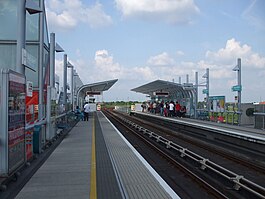Royal Albert DLR station
In this article, we will explore the fascinating world of Royal Albert DLR station. From its origins to its impact on today's society, Royal Albert DLR station has been the subject of countless studies and debates over the years. As we progress through this in-depth analysis, we will discover the many facets that have contributed to Royal Albert DLR station's prominence in different spheres, be it popular culture, science, politics, or any other sphere of everyday life. Without a doubt, Royal Albert DLR station represents a highly relevant topic that deserves to be examined from different perspectives to understand its true scope and importance in the modern world.
| Royal Albert | |
|---|---|
 The station in 2008 | |
| Location | Beckton |
| Local authority | London Borough of Newham |
| Managed by | Docklands Light Railway |
| Number of platforms | 2 |
| Accessible | Yes |
| Fare zone | 3 |
| DLR annual boardings and alightings | |
| 2018 | |
| 2019 | |
| 2020 | |
| 2021 | |
| 2022 | |
| Key dates | |
| 28 March 1994 | Opened |
| Other information | |
| Coordinates | 51°30′30″N 0°02′45″E / 51.5083°N 0.0459°E |
Royal Albert DLR station is a station on the Docklands Light Railway (DLR) in Beckton in east London. The station serves the western end of the north quay of the Royal Albert Dock, from which it takes its name. A view of the London City Airport is available.
The station is located on an elevated section of the DLR's Beckton branch, between Prince Regent and Beckton Park stations. It is in Travelcard Zone 3.
History
The station was opened on 28 March 1994. There was previously a station called Connaught Road on the Eastern Counties and Thames Junction Railway in the same area but this closed in 1940.
It was originally planned that in 2010 work would start on extending the platforms at Royal Albert to handle three-car trains, which are being introduced across the DLR. The extension would have been at the east end of the station, bringing the platforms closer to Royal Docks Road, although no new access steps were planned. The platforms have not however been extended, and although metal catwalks have been installed, these are too narrow for non-emergency use and Selective Door Operation is used instead.
2010 should have also seen Royal Albert served by a second DLR service. The existing route between Beckton and Tower Gateway would have been supplemented by a second service between Beckton and Stratford International via Canning Town using the new DLR tracks from Canning Town to Stratford International. However this extension was severely delayed and didn't open until 31 August 2011.
Services
The typical off-peak service in trains per hour from Royal Albert is:
- 12 tph to Canning Town of which 6 continue to Tower Gateway
- 12 tph to Beckton
Additional services call at the station during the peak hours, increasing the service to up to 16 tph in each direction.
| Preceding station | Following station | |||
|---|---|---|---|---|
| Prince Regent towards Tower Gateway
|
Docklands Light Railway | Beckton Park towards Beckton
|
Design
During disruption, Royal Albert acts as a terminus with a shuttle between Royal Albert and Beckton. [citation needed] This is possible because there is a crossover to the west of the station.
Location
The station is further from the nearest houses than any other on the DLR, despite which it has a steady patronage from those living in the area of Beckton to the north. In fact the station signage is subtitled "For West Beckton". However, the access route from these houses to the station, crossing the busy Royal Albert Way on the level, is notably substandard, the only footbridge being some distance away.
Following the relocation of many London Borough of Newham council staff to the Building 1000 offices adjoining the station, usage has increased substantially during office hours.
The station serves the London Regatta Centre and Royal Docks Business Park which houses Newham Council.
London Buses routes 300 and 376 serves the station.
Gallery
-
Looking east
-
Looking west
-
Signage on eastbound platform
References
- ^ "Step free Tube Guide" (PDF). Transport for London. April 2021. Archived (PDF) from the original on 15 May 2021.
- ^ "Station Usage Data" (XLSX). Usage Statistics for London Stations, 2018. Transport for London. 23 September 2020. Retrieved 9 January 2022.
- ^ "Station Usage Data" (XLSX). Usage Statistics for London Stations, 2019. Transport for London. 23 September 2020. Retrieved 9 January 2022.
- ^ "Station Usage Data" (XLSX). Usage Statistics for London Stations, 2020. Transport for London. 16 April 2021. Retrieved 9 January 2022.
- ^ "Station Usage Data" (XLSX). Usage Statistics for London Stations, 2021. Transport for London. 12 July 2022. Retrieved 7 September 2022.
- ^ "Station Usage Data" (XLSX). Usage Statistics for London Stations, 2022. Transport for London. 4 October 2023. Retrieved 20 October 2023.
- ^ "DLR train timetables". Transport for London. Retrieved 8 August 2023.



